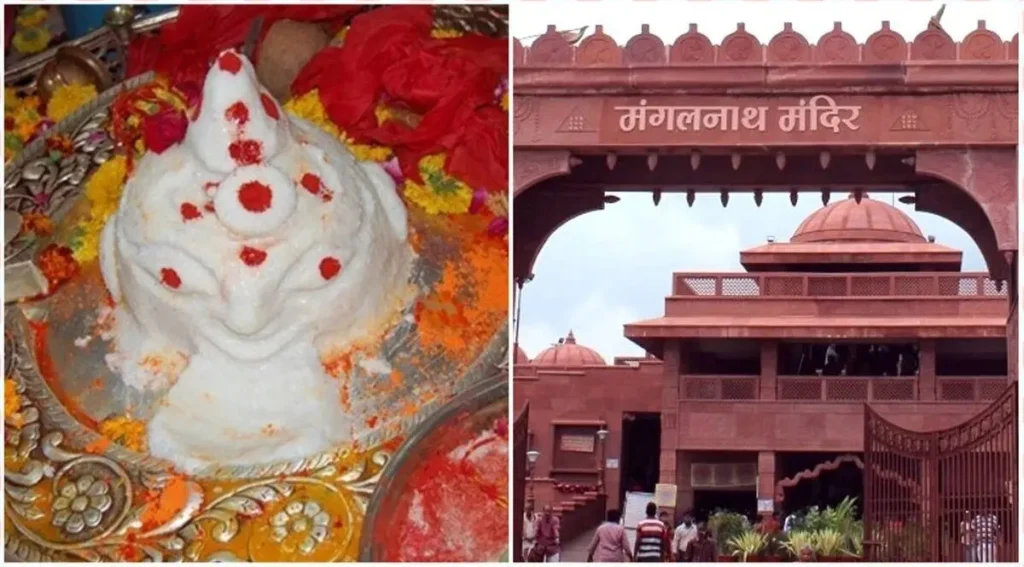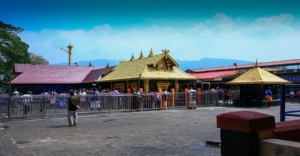Mangalnath Mandir, located in Ujjain, Madhya Pradesh, is a revered temple dedicated to Lord Mangal (Mars), the planet that represents strength, courage, and victory in Hindu astrology.
It is believed that performing poojas and rituals at this temple can mitigate the malefic effects of Mars in one’s horoscope. This guide details the various poojas offered at Mangalnath Mandir, their significance, and the associated costs.
Join Explore India Community
Introduction to Mangalnath Mandir
Mangalnath Mandir is one of the most significant temples in Ujjain, particularly for those seeking to balance the malefic effects of the planet Mars.
According to Hindu mythology, Ujjain is considered the birthplace of Lord Mangal, and the temple is situated on the banks of the Kshipra River.
The temple’s serene environment and spiritual significance make it a powerful place for performing astrological remedies.
Significance of Poojas at Mangalnath Mandir
Performing poojas at Mangalnath Mandir is believed to have a profound impact on one’s life, especially for those suffering from Mangal Dosha or other astrological challenges associated with the planet Mars.
These rituals are performed to appease Lord Mangal and seek his blessings for strength, courage, prosperity, and overall well-being.
Types of Poojas and Their Costs

Mangalnath Mandir offers a variety of poojas, each with its significance and purpose. Here is a breakdown of the most common poojas, their costs, and what they involve:
Mangal Dosh Nivaran Pooja
Purpose:
This pooja is specifically performed to mitigate the effects of Mangal Dosha (also known as Kuja Dosha) in one’s horoscope, which is often linked to marital discord, financial challenges, and health issues.
Cost:
- Basic Pooja: 1,500 – 2,500 INR
- Elaborate Pooja: 5,000 – 7,000 INR (Includes additional rituals and offerings)
Details:
The pooja involves chanting of specific mantras, offerings to Lord Mangal, and rituals to appease the planet Mars. The elaborate pooja may also include a homa (fire ritual) and additional offerings like red flowers, sweets, and specific grains.
Mangal Graha Shanti Pooja
Purpose:
This pooja is aimed at pacifying the negative influences of Mars in one’s astrological chart, thereby promoting peace, prosperity, and good health.
Cost:
- Standard Pooja: 3,000 – 5,000 INR
- With Homam: 8,000 – 12,000 INR
Details:
The ritual involves a detailed recitation of the Mangal Graha Shanti mantras, offerings to Lord Mangal, and a homam to invoke divine blessings. This pooja is often recommended for those facing challenges in career, relationships, or health due to Mars.
Navagraha Pooja
Purpose:
The Navagraha Pooja is performed to appease all nine planets, including Mars, ensuring a balanced and harmonious life.
Cost:
- Basic Pooja: 2,500 – 4,000 INR
- Complete Pooja: 7,000 – 10,000 INR
Details:
This pooja includes prayers and offerings to all nine planets (Navagrahas). It is a comprehensive ritual that aims to bring overall peace and prosperity by balancing the influences of all planetary forces.
Rudrabhishek
Purpose:
Rudrabhishek is a powerful ritual dedicated to Lord Shiva, who is believed to have control over all planetary influences, including Mars. It is often performed in conjunction with other poojas to enhance their effectiveness.
Cost:
- Rudrabhishek: 2,000 – 3,500 INR
- With Special Offerings: 5,000 – 7,500 INR
Details:
The ritual involves bathing the Shiva Lingam with various sacred substances like milk, honey, and ghee while chanting Vedic mantras. This pooja is believed to remove obstacles and grant divine blessings.
Special Poojas and Offerings
Purpose:
These are customized poojas that may include a combination of rituals or specific offerings to Lord Mangal, tailored to the devotee’s needs.
Cost:
- Special Pooja Package: 10,000 – 15,000 INR
- Customized Offerings: Varies based on requirements
Details:
Special poojas may involve additional rituals like Saptashati Path, special homams, or extended prayer sessions. Devotees can consult with the temple priests to customize these rituals according to their specific astrological needs.
Booking and Arrangements for Poojas
To perform any pooja at Mangalnath Mandir, it’s advisable to book in advance, especially during auspicious days or festival seasons. Bookings can be made directly at the temple or through local pandits who assist with the arrangements.
- Booking Methods: In-person at the temple, through the temple’s official channels, or via local pandits.
- Advance Booking: Recommended at least a week prior, especially for elaborate or special poojas.
Best Time to Perform Poojas
The timing of poojas can be crucial for maximizing their effectiveness. Here’s a guide on when to perform these rituals:
- Tuesday: Considered the most auspicious day for worshipping Lord Mangal.
- Mangal Dosha Days: Specific dates in the lunar calendar that are especially powerful for mitigating the effects of Mangal Dosha.
- Festivals: Navaratri, Makar Sankranti, and other major Hindu festivals are also considered auspicious for performing poojas.
Visitor Tips and Guidelines
When visiting Mangalnath Mandir for pooja, consider the following tips:
- Dress Code: Wear traditional, modest clothing. Red is considered an auspicious color for rituals related to Mars.
- Offerings: Flowers, especially red ones, sweets, and specific grains like red lentils are commonly offered to Lord Mangal.
- Timings: Poojas are typically performed in the morning or early afternoon. It’s advisable to reach the temple early to avoid crowds.
Join Explore India Community
Conclusion
Performing a pooja at Mangalnath Mandir is not just a ritual but a deeply spiritual experience that can bring peace, prosperity, and balance to your life. By understanding the costs, significance, and proper arrangements for these poojas, devotees can ensure that they receive the maximum benefits from their visit to this sacred temple.
FAQs (Frequently Asked Questions)
Consulting an astrologer or the temple priests can help determine the most suitable pooja based on your horoscope.
Yes, multiple poojas can be performed, but it’s advisable to consult with the priests to ensure the timing and rituals align properly.
Common offerings include red flowers, sweets, red cloth, and specific grains. The temple priests can provide a detailed list based on your pooja.
Yes, arrangements can be made for the pooja to be performed on behalf of someone not physically present at the temple.
- 7 Day Bali Itinerary: Explore The Best Of Bali In A Week

- How to reach Mousuni Island from Kolkata?: An easy travel guide

- Sabarimala: How Many KM From Pamba To Sannidhanam?

- Top Things to Do Nearby El Nido, Palawan: Exploring Paradise Beyond the Usual

- How to Reach Sundarban From Kolkata? Most Scenic Route [2025]

- How Many Km From Pamba To Sannidhanam?

















